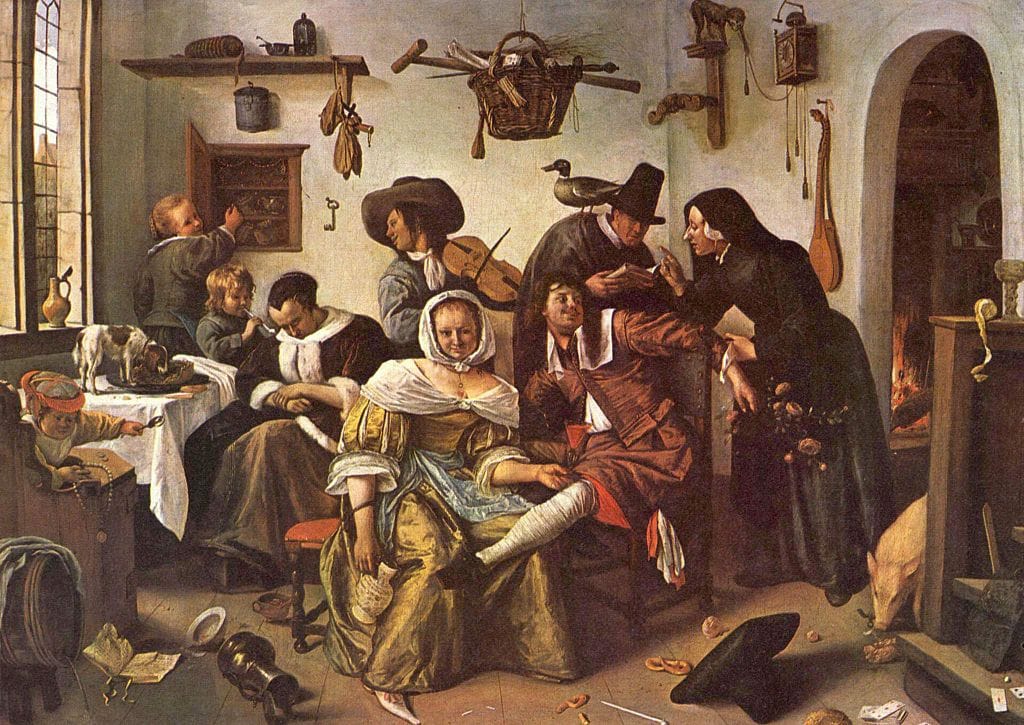luxury

Today, we associate luxury with wealth, opulence, and indulgence, but the word originally meant lust, sexual intercourse, or just more generally sensual pleasure. The word was imported into English by the Normans, coming from the Old French luxure (lust, lechery), which in turn is from the Latin luxuria, which meant riotous living or extravagance, in classical Latin. But in medieval Latin the word had also come to mean lust or sexual license. This sexual sense is reflected in both the early English use of the word as well as in the Anglo-Norman noun and in the verb luxurier (to fornicate) and the adjective luxurius (lustful, lecherous).
Luxury is first recorded in English in the Ayenbite of Inwyt, a confessional text copied by a Kentish monk in 1340. It’s a translation of the French Somme le Roi, a very popular book in its day:
Þet uerste heaued of þe beste of helle: ys prede. Þet oþer is enuie. þe þridde wreþe. þe uerþe sleauþe þet me clepeþ ine clergie: accidye. þe vifte icinge. in clergie auarice. oþer couaytise. þe zixte glotounye. þe zeuende lecherie oþer luxurie.
(The first head of the beast of hell is pride. The next is envy. The third wrath. The fourth sloth, that we in the clergy call accidie. The fifth greed, in the clergy avarice or covetousness. The sixth is gluttony. The seventh lechery or luxury.)
The sense of luxury meaning wealth, splendor, opulence doesn’t appear until the early seventeenth century. Phineas Fletcher uses the word in both the lust and opulence senses in two different poems, both published in 1633. The sexual sense appears in his poem The Purple Island, canto 3, stanza 25:
Where Venus and her wanton have their being:
For nothing is produc't of two in all agreeing.
But though some few in these hid parts would see
Their Makers glory, and their justest shame;
Yet for the most would turn to luxurie.
And the modern sense of opulence appears in the poem Elisa, canto 25:
I never knew or want or luxurie,
Much lesse their followers; or cares tormenting,
Or ranging lust, or base-bred flatterie.
Since this modern English sense is closer to the original Latin meaning, it is probably the result of people reinterpreting the word to reflect the old meaning. Most literate people of the time also knew Latin and would have been familiar with how classical writers used the word. It is this sense that survives today, and luxury has lost whatever sexual connotations it once had.
Sources:
Anglo-Norman Dictionary, 2012, s.v. luxure, n.
Dan Michel’s Ayenbite of Inwyt, vol. 1. Pamela Gradon, ed. Richard Morris, transcription (1866). London: Oxford UP, 1965, Early English Text Society O.S. 23. 16. HathiTrust Digital Archive.
Dictionary of Medieval Latin from British Sources. Ronald E. Latham, David R. Howlett, and Richard K. Ashdown, eds. Oxford: British Academy, 2013. Brepolis: Database of Latin Dictionaries.
Fletcher, Phineas. The Purple Island, or, The Isle of Man, Together with Piscatorie Eclogs and Other Poeticall Miscellanies.. Cambridge: Printers to the University of Cambridge, 1633, 34–35 and 111. ProQuest: Early English Books Online (EEBO).
Lewis, Charlon T. and Charles Short. A Latin Dictionary (1879). Oxford: Oxford UP, 1933, s.v. luxuria. Brepolis: Database of Latin Dictionaries.
Middle English Dictionary, 2024, s.v. luxuri(e, n.
Oxford English Dictionary, second edition, 1989, s.v. luxury, n.
Image credit: Jan Steen, c. 1663. Kunsthistorisches Museum (Vienna). Wikimedia Commons. Public domain image as a mechanical reproduction of a public domain work.